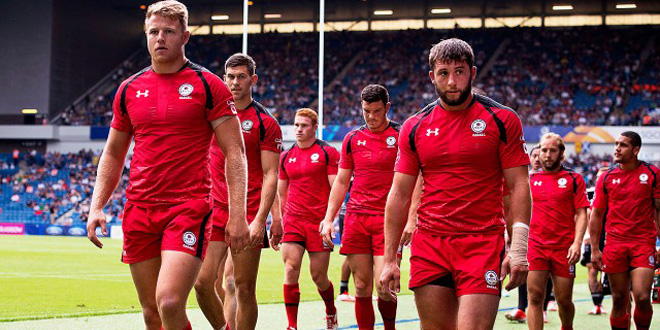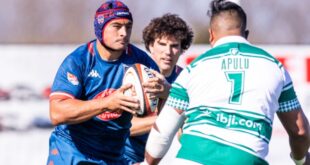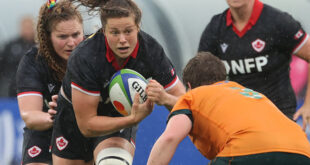After an impressive 6th place finish in last year’s HSBC Sevens World Series, the Olympics looked as sure a bet as any. Even the most rabid supporter would not have picked Canada to qualify via a top four finish on the circuit this year, but the route through NACRA looked pretty cozy. A year on, and prospects are emphatically less certain.
It’s not so much that Canada have faded. They have somewhat, there’s no sense denying it, but their chief rivals have improved almost out of sight. With acclaimed head coach Michael Friday now running the shop alongside first lieutenant Chris Brown and the fanatically meticulous Alex Magleby, the US Eagles have had such a turnaround in one year that they are now favoured to win this weekend.
By contrast new Canadian coach Liam Middleton and Co. have endured a challenging season. Replacing a popular and successful figure in Geraint John was always going to be difficult, but issues with bureaucratic red tape delayed his arrival, and then came the injuries. It’s hard to see how any country could cope with losing its two star playmakers – Phil Mack and Nathan Hirayama – let alone Canada whose pool of talent, as Middleton has found out, is not quite up to scratch.
Add to that names like Nanyak Dala, Ciaran Hearn, Harry Jones… veteran players who missed some or all of the first half of the season. In an interview with Neil Davidson of the Canadian Press mid-season, Middleton summed it up concisely: a thin layer of talent but no structure underneath.
It’s a problem compounded by the fact that Canada’s best domestic players do double duty – they regularly switch between sevens and fifteens. While other nations might have one or two senior fifteens players in the squad, Canada regularly fields squads composed almost entirely of capped internationals. Only Portugal come even close to that ratio from the series regulars.
This weekend drives that point home with an iron stake. Of the 14 players in the training squad, only Adam Zaruba and Justin Douglas have not played for the fifteens side, and the vast majority of the group are expected to be in Kieran Crowley’s extended World Cup squad later this summer. The Eagles meanwhile have four capped players – Danny Barrett, Andrew Durutalo, Folau Niua, and Chris Wyles – and while Barrett and Niua may get the call from Mike Tolkin, only Wyles is a certainty to head to England.
The modern sevens game is fully professional and played by specialists at the highest levels. That’s not to say that overseas professionals Taylor Paris, Jeff Hassler, and Tyler Ardron are no longer up to the job, but it’s a big ask for them to step back into the game after two years away and perform at their best. The big sides of the circuit – New Zealand, Fiji, South Africa – all recognize this, and will welcome few if any such players back into the squad ahead of Rio.
Evidently this fact is not lost on Middleton, and with the expansion of the Maple Leafs development program and the National University Sevens it appears the structures are starting to be put in place, but there remains the issue of funding, and of priority. The bulk of the domestic elite funding comes from the Own The Podium, which is specifically geared towards Olympic development. Without competing on the sevens circuit, Canada’s best athletes are paying out of pocket. It’s a problem that incoming high performance manager Jim Dixon will have to address sooner than later.
In the meantime all eyes are on the rugby at hand. The Eagles created history by becoming the first North American side to win a cup final with a terrific performance in London to close the series. You couldn’t ask for a better psychological boost ahead of the Olympic qualifiers. Canada rebounded in the second half of the season, consistently finishing in the top eight and recording their own first – a famous victory over New Zealand. Despite that fact, on the surface it appears that the Americans remain a step ahead.
Aside from trying to integrate Ardron, Paris, and Hassler back into sevens mode, Middleton will be praying that Mack’s knee injury is fully healed and Hearn’s ankle is ready for battle. Both are critical to success. Canada will use the early pool games against the likes of Guyana and the Cayman Islands to find their footing, but make no mistake it’s the Eagles who have their greatest attention.
It’s easy enough to look at the jaw-dropping pace of Carlin Isles and Perry Baker as trouble spots, but the Americans are now a complete side. Madison Hughes and Maka Unufe open holes as well as any, and Barrett and Zack Test barge through them. They are now legitimately world class and even with Canada’s strongest lineup of the season it will be some task to unseat them.
Should the Americans win, it’s not all doom and gloom for Canada. There remains a repechage avenue in a time and location yet to be announced, but that road is just as rocky, with either Australia or Samoa certain to be in the way.
Win or lose, Canada will play rugby at the Olympics, as the women’s side has already qualified. They are flying the flag for Canadian rugby at the moment on all fronts. Fans from all corners of the country will be hoping the men follow suit. Preferably on Sunday in North Carolina, but after the shaky start to the season, we’ll take it any way we can.
 Americas Rugby News Rugby news from across the Americas!
Americas Rugby News Rugby news from across the Americas!




